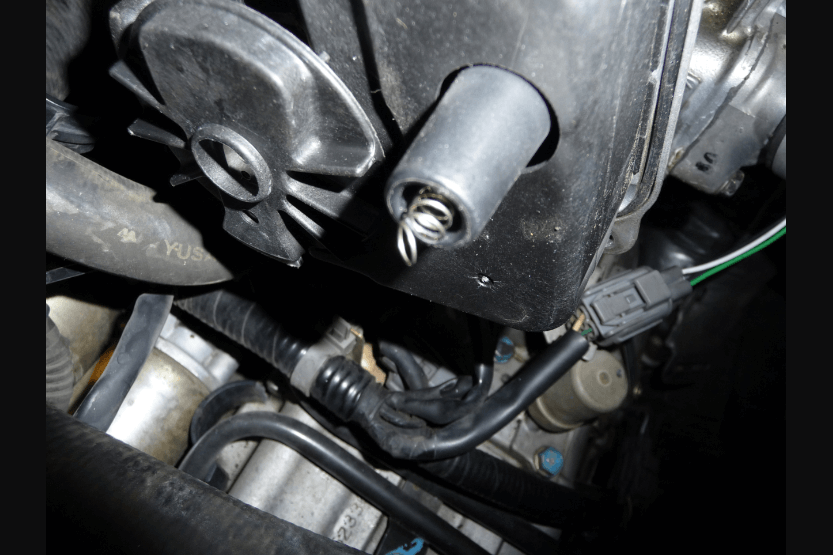Driving with a bad ignition coil can be a dangerous situation for any driver. Ignition coils play a crucial role in the engine’s ignition system by converting the battery’s low voltage into the high voltage needed to spark the spark plugs.
When an ignition coil fails, it can cause a sudden and drastic loss of engine power, engine misfires, rough idling, stalling, reduced fuel economy, and an illuminated check engine light.
While it is possible to drive with a bad ignition coil, it is not recommended. Continuing to drive with a bad ignition coil can cause damage to other parts of the vehicle, such as the catalytic converter, the powertrain control module, and even the engine.
The longer a driver continues to operate a vehicle with a bad ignition coil, the higher the risk of causing more significant problems down the road. Therefore, it is essential to address any issues with ignition coils as soon as possible to avoid more extensive and expensive repairs.
It is important to note that not all symptoms of a bad ignition coil are immediately noticeable, and some drivers may not even realize they have a problem until it is too late.
Therefore, it is crucial to have regular maintenance and inspections performed on the vehicle, especially if the vehicle is showing any signs of a bad ignition coil. By taking proactive measures, drivers can ensure that their vehicles are safe to operate and avoid costly repairs in the future.
How Can You Tell If Ignition Coil Is Bad?

If you suspect that your car’s ignition coil is bad, there are some common symptoms to look out for.
As per Firestone Complete Auto Care, ignition coils are responsible for providing the spark that ignites the fuel in the engine. When they fail, it can cause a number of issues with your car’s performance.
One of the most common signs of a bad ignition coil is a check engine light. If your car’s computer detects a problem with the ignition system, it will trigger the check engine light to come on. This can be caused by a faulty ignition coil or other issues with the ignition system.
Another symptom of a bad ignition coil is misfiring. This can cause your engine to run rough or even stall. Misfiring can also cause your car to backfire, which can be dangerous. If you notice that your car is misfiring, it’s important to get it checked out by a mechanic as soon as possible.
Poor fuel economy can also be a sign of a bad ignition coil. When the ignition coil isn’t working properly, it can cause the engine to run inefficiently, which can lead to increased fuel consumption. If you notice that your car is using more gas than usual, it could be a sign of a bad ignition coil.
Rough idling is another symptom of a bad ignition coil. If your car’s engine is idling roughly or shaking, it could be caused by a faulty ignition coil. This can also cause your car to stall or have trouble starting.
In summary, if you notice any of these symptoms, it’s important to get your car checked out by a mechanic. Ignition coil problems can lead to serious issues with your car’s performance, and it’s important to address them as soon as possible.
What Happens When an Ignition Coil Goes Bad While Driving?
When an ignition coil goes bad while driving, it can cause a range of problems that can affect the performance of the engine.
The ignition coil is a vital component of the engine’s ignition system that is responsible for generating the high voltage needed to ignite the air-fuel mixture in the combustion chamber.
One of the most common symptoms of a bad ignition coil is a misfiring engine. This occurs when the spark plug fails to ignite the air-fuel mixture in the combustion chamber, causing the engine to run rough or stall.
A misfiring engine can be caused by a faulty ignition coil, a bad spark plug, or a problem with the air-fuel mixture, such as a lean or rich condition.
Another symptom of a bad ignition coil is a loss of engine performance. This can manifest as reduced power and acceleration, poor fuel economy, and a rough idle. A bad ignition coil can also cause the engine to stall or fail to start altogether.
In some cases, a bad ignition coil can also trigger the check engine light to come on. This is because the engine’s onboard computer is detecting a problem with the ignition system, which can affect the performance of the engine.
Overall, driving with a bad ignition coil can be dangerous and can cause serious damage to the engine if left unaddressed. If you suspect that your ignition coil is failing, it is important to have it checked by a qualified mechanic as soon as possible to avoid further problems.
What Causes Ignition Coil Problems?

Ignition coil problems can be caused by a variety of factors, including wear and tear, age, and damage. Here are some of the most common causes of ignition coil problems:
Overheating
Ignition coils can overheat if they are exposed to high temperatures for extended periods of time. This can cause the insulation around the coil to break down, resulting in a short circuit.
Overheating can be caused by a number of factors, including a faulty cooling system, a clogged radiator, or a malfunctioning thermostat.
Wear and Tear
Ignition coils can wear out over time due to normal use. The coil windings can become damaged or the insulation can break down, leading to a short circuit. This can cause the coil to fail completely or to produce a weak spark, resulting in poor engine performance.
Age
Ignition coils can also fail due to age. As the coil ages, the insulation around the windings can break down, leading to a short circuit. Additionally, the coil windings can become damaged over time, resulting in a weak spark.
Damage
Ignition coils can be damaged by a number of factors, including impact damage, exposure to water or other liquids, and exposure to corrosive substances. Damage to the coil can cause it to fail completely or to produce a weak spark, resulting in poor engine performance.
Fuel and Air
Fuel and air are essential components of the internal combustion engine. If either of these components is not properly regulated, it can cause ignition coil problems. For example, if the engine is running too rich (too much fuel and not enough air), it can cause the ignition coil to overheat and fail.
Gas Mileage and Fuel Consumption
Ignition coil problems can also affect gas mileage and fuel consumption. If the ignition coil is not functioning properly, it can cause the engine to misfire, resulting in poor fuel economy.
Additionally, if the coil is producing a weak spark, it can cause the engine to run less efficiently, resulting in higher fuel consumption.
Professional Diagnosis and Tools
If a driver suspects that their ignition coil is bad, they should consider taking their vehicle to a mechanic or professional technician for a proper diagnosis. These professionals have the necessary tools and experience to accurately diagnose the problem and provide the best solution.
One of the tools that a mechanic or technician may use to diagnose a bad ignition coil is a spark tester. This tool is used to check if the ignition coil is producing enough voltage to create a spark in the spark plugs.
If the spark tester indicates that the ignition coil is not producing enough voltage, then it may be time to replace the ignition coil.
Another tool that a mechanic or technician may use is a multimeter. This tool is used to measure the voltage and resistance of the ignition coil. If the multimeter readings indicate that the ignition coil is faulty, then it may need to be replaced.
It is important to note that a bad ignition coil can cause a variety of symptoms, such as engine misfires, stalling, poor performance, and lower fuel economy. However, these symptoms can also be caused by other problems, such as a clogged fuel filter or a faulty spark plug.
Therefore, it is important to have a professional diagnose the problem to ensure that the correct solution is implemented.
In conclusion, if a driver suspects that their ignition coil is bad, they should consider taking their vehicle to a mechanic or professional technician for a proper diagnosis. These professionals have the necessary tools and experience to accurately diagnose the problem and provide the best solution.
Ignition Coil Replacement

When a vehicle’s ignition coil begins to fail, it can cause a variety of problems. These problems can range from decreased fuel efficiency to engine misfires, and in some cases, a complete failure to start.
If a driver suspects that their ignition coil is failing, it is important to have it replaced as soon as possible.
The process of replacing an ignition coil can vary depending on the make and model of the vehicle. Some vehicles use a single coil pack that contains all of the ignition coils, while others use a coil-on-plug design where each spark plug has its own individual coil.
In either case, AutoZone mentioned that the replacement process involves disconnecting the old coil and installing a new one.
Before beginning the replacement process, it is important to ensure that the engine is cool and the emergency brake is engaged. It is also recommended to disconnect the negative battery cable to prevent electrical shocks or damage to the vehicle’s electronics.
Once the old coil has been removed, the new coil can be installed in its place. It is important to ensure that the new coil is properly aligned and securely fastened in place.
After the new coil has been installed, the vehicle should be started and checked for proper operation. If there are still issues with the vehicle’s performance, it may be necessary to replace additional components of the ignition system.
From a mechanic’s perspective, I can tell you that replacing a failing ignition coil is a fairly straightforward task.
This process can significantly enhance your vehicle’s performance and fuel efficiency. However, it’s crucial to entrust this replacement to a skilled mechanic to guarantee a safe and accurate job.
Final Thoughts
In conclusion, driving with a bad ignition coil is not recommended. The loss of power and increased vibrations can make the vehicle difficult to control and can lead to further damage to the engine.
However, in some cases, it may be possible to drive with a bad ignition coil for a short period of time. This should only be done in an emergency situation and the driver should take the vehicle to a mechanic as soon as possible.
It is important to note that a faulty coil pack can cause damage to other parts of the engine, such as the catalytic converter and oxygen sensors. This can lead to more expensive repairs down the line.
If a driver suspects that their ignition coil is bad, they should look out for symptoms such as misfiring, stalling, and decreased fuel efficiency. They should also have the vehicle inspected by a mechanic to diagnose and fix the issue.
Overall, it is best to avoid driving with a bad ignition coil and to have any issues with the ignition system addressed promptly. This will help ensure the safety and longevity of the vehicle.

![How to Start a Car Without a Key [Turn Ignition Without Key] how to start a car without a key](https://roadsumo.com/wp-content/uploads/2021/06/how-to-start-a-car-without-a-key-150x150.jpg)

![Driving With a Bad Purge Valve [What Happens? Signs and Symptoms] driving with a bad purge valve](https://roadsumo.com/wp-content/uploads/2022/02/driving-with-a-bad-purge-valve-150x150.jpg)
![Bad Timing Belt Symptoms [6 Main Symptoms] Bad Timing Belt Symptoms](https://roadsumo.com/wp-content/uploads/2021/09/bad-timing-belt-symptoms-150x150.jpg)


![Read more about the article Maaco Paint Job Cost [How Much Is It?]](https://roadsumo.com/wp-content/uploads/2022/01/Maaco-paint-job-cost-300x200.jpg)
![Read more about the article Electric Parking Brake Problems [Causes and How to Fix]](https://roadsumo.com/wp-content/uploads/2022/05/electric-parking-brake-problems-300x200.jpg)
